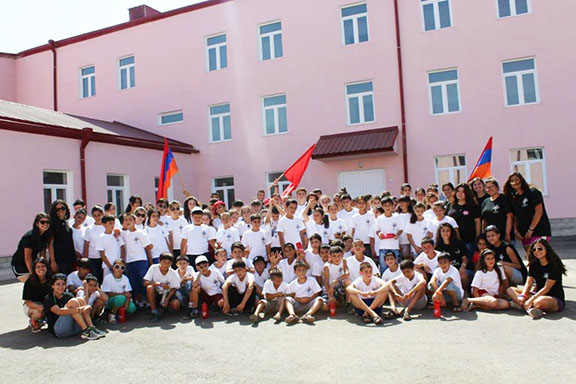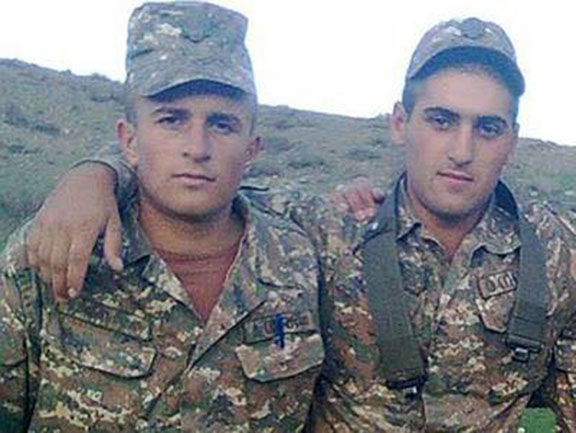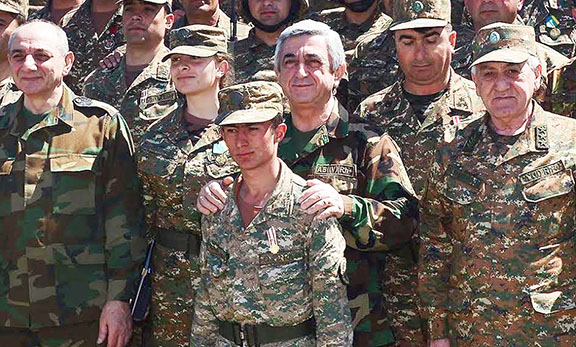
AYF Youth Corps participants in Martuni in 2014
BY DICKRAN KHODANIAN
From The Armenian Weekly
Earlier this month, I received an unexpected phone call from my good friend Arthur from Martuni, Artsakh (Nagorno-Karabakh/NKR) who is currently serving his mandatory two years in the NKR Armed Forces.
After not being able to see him during my six months in Armenia and generally not being in contact since he started his military service, Arthur explained that he had gotten a new phone and happened to be in Stepanakert for a day of rest. In Stepanakert, he had access to WiFi, which led to his call.
To provide some backstory, Arthur is a member of the Armenian Youth Federation (AYF) of Artsakh Martuni chapter. Martuni is about an hour east of Stepanakert. It is the region where Monte Melkonian was the regional commander during the Artsakh War. I found this out during my time there when literally everyone, regardless of age, knew who Monte was and what he had done for the people of Martuni. That and the fact that there was a statue of Monte in the town center.

From left Vladimir Narinyan and Yuri Pharamazyan
I first visited Martuni in July 2014 with the AYF Youth Corps program—a program, which started in 1994 following the NKR ceasefire, which sent diasporan youth to Artsakh to help rebuild various villages. In 2008, the program began to operate as a summer day camp for underprivileged youth in Armenia and Artsakh. AYF Youth Corps provides the opportunity for young diasporans to become counselors at day camps, in an effort to establish and strengthen ties with the homeland.
In the summer of 2014, the AYF Western United States was holding a day camp in Martuni for the first time. Other AYF regions, specifically Lebanon, had held camps there in the past.
Arthur was one of the first people I met from Martuni. He was a short, skinny, 17-year-old kid, who was assigned to help my Youth Corps group with whatever we needed during our time in Martuni.

Unger Arthur receiving the Battle Cross Order of Artsakh
In addition to developing bonds with the children from camp, I developed a genuine friendship with Arthur. He spent almost every second with our group and made sure that we received everything we needed. To some, he may have seemed like an annoying pest of a little brother, but it soon became clear to all that he was simply trying to fulfill his responsibilities as an AYF member.
During those two weeks, Arthur openly discussed his thoughts about leaving for his mandatory conscription. He would tell me that he was actually quite nervous, but felt it was an honor to serve his country.
Arthur has grown up hearing about constant ceasefire violations by Azerbaijan; casualties at the border were an ongoing occurrence. However, as he was getting closer to begin his service, everything began to hit home.
Regardless of his apprehension, Arthur put up a brave front. He knew that serving his homeland was just part of his patriotic duty.
After our two-week program completed, we said our goodbyes, and I was confident that I would still keep in contact with the locals of Martuni, especially Arthur. I figured we would keep in touch through Facebook.
Up to the point Arthur turned 18, we kept in touch through Facebook, Skype, and Viber. Although he was an AYF member from Martuni, a sense of camaraderie (ungerutiun) that was very much present, brought us even closer as friends. We would talk about the work of our regions: the differences, the similarities, and relations of the diaspora with the AYF in Armenia and Artsakh. Arthur would describe his experience with helping out the AYF Juniors in Martuni and was honest enough to explain some of the hardships he came across there.
Eventually, he became my little brother from Artsakh.
When Arthur turned 18 and began his military service, contact with him came to an abrupt halt. I didn’t expect him to have a cellphone or the necessary connection to communicate during his military service. From time to time, I would ask other friends from Martuni if they had heard anything from Arthur and they would always assure me that he was fine. However, at other times, I wouldn’t hear a thing.
When the Four-Day War began in April, I was genuinely worried that I might read his name in the news. I tried reaching out to friends in Martuni, but to no avail. I was worried for every one of our brave soldiers protecting our frontlines, but the feeling of having a little brother out there really hit hard.
A couple of weeks after, an Armenian military website titled “RazmInfo” published a picture of what seemed to be Arthur receiving a Battle Cross Order of Artsakh and shaking hands with Armenian President Serge Sarkisian. However, the description of this post described the recipient with a different name—not Arthur’s.
Unger Arthur receiving the Battle Cross Order of Artsakh
I wasn’t sure why this was the case, but thought that perhaps it was another soldier that resembled him. Hours later, a full article was posted with the recipients of the Battle Cross Order, which included Arthur’s name. The photo posted previously was in fact Arthur.
This was the first time I had heard about Arthur since he began his military service. Arthur’s actions made me proud of him, of my homeland, and of all the courageous men serving and protecting our borders.
Despite his small figure, Arthur’s demeanor was grand. The same 17-year-old unger, who would tell me how nervous and apprehensive he was prior to the start his service, was now the recipient of the Battle Cross Order of Artsakh.
And just last week, about eight months later, I spoke to him for the first time in a year in a half.
I was in disbelief.
He explained to me that everything was just fine and that he had about seven or eight months until he completed his service. We talked about the work of all the different organizations and the overall support of the diaspora following the Four-Day War. He assured me that the global Armenian nation was standing with Artsakh in the fight.
Arthur also made me make a promise to convey his message to the other AYF members in my region. He wanted to thank his fellow AYF members for their continuous work and for organizing programs for Artsakh. He said that regardless of what they may lacking in Artsakh, unity and friendships with fellow Armenians from the diaspora is something they have. And this fact gives them strength and support.
Arthur asked me about how my school and my life were going. He also asked about all the other Youth Corps participants individually to make sure they were all doing well.
Then, our conversation took a dark turn. Arthur told me about the deaths of Yuri Pharamazyan (b. 1996) and Vladimir Narinyan (b. 1996), who died in the early days in the Four-Day War. Both were fellow AYF members from Martuni and good friends of Arthur’s. In addition, the two servicemen were participants and helpers of the camp in Martuni during the Youth Corps program.
Yuri died in the early hours of the war on April 2, shielding two of his friends from enemy fire and sacrificing his own life to save theirs. Vladimir died on April 5 near Mataghis from shrapnel wounds received while fulfilling his military service.
Yuri and Vladimir were good friends who had grown up together, who had served in the same unit, and who died in the same week. I never got the chance to meet these brave men during my time in Martuni, since they had already started their service. But based on what Arthur told me, they were dedicated members of the AYF.
After working on the AYF With Our Soldiers program in Armenia and Artsakh and visiting various families of fallen soldiers, I never knew that these two deaths were of AYF members from a region where I had visited, who had participated in Youth Corps, and with who I had mutual friends. These deaths do not weigh any different from the rest of the more than 100 that took place during the Four-Day War. However, for me, the loss of these two heroes takes on different meaning.
The two were ungers like Arthur who I’m sure had developed friendships with other AYF members from around the world who had held Youth Corps there.
In my experience as an AYF member from the Western Region, maintaining relationships with fellow AYF members from regions around the world and that feeling of worldwide camaraderie has been an essential component in my life—the fact that this ideology binds us together regardless of where we are from.
Arthur, Yuri, and Vladimir are prime examples of that.
As AYF members around the world, we’re connected and linked by these common sets of motives, beliefs, and beliefs.
These ungers are the product of programs like Youth Corps that have only flourished as years have gone by.
I thank the AYF for providing me the opportunity to meet and establish lifelong friendships with heroes from the homeland like Arthur. Unfortunately, I was never able to meet Yuri or Vladimir. With their deaths, the AYF family has experienced the loss of two noble leaders of the community.
To my Artsakh ungers Yuri, Vladimir,
Rest in Peace. You two, along with the other fallen soldiers of the Four Day War, have left a legacy that all young people will remember and educate upcoming generations about.
And to Arthur and all the current soldiers protecting our borders,
I wish you safe service and strength.
Source: Asbarez
Link: For Yuri, Vladimir, Arthur And the Rest of My Artsakh Ungers
